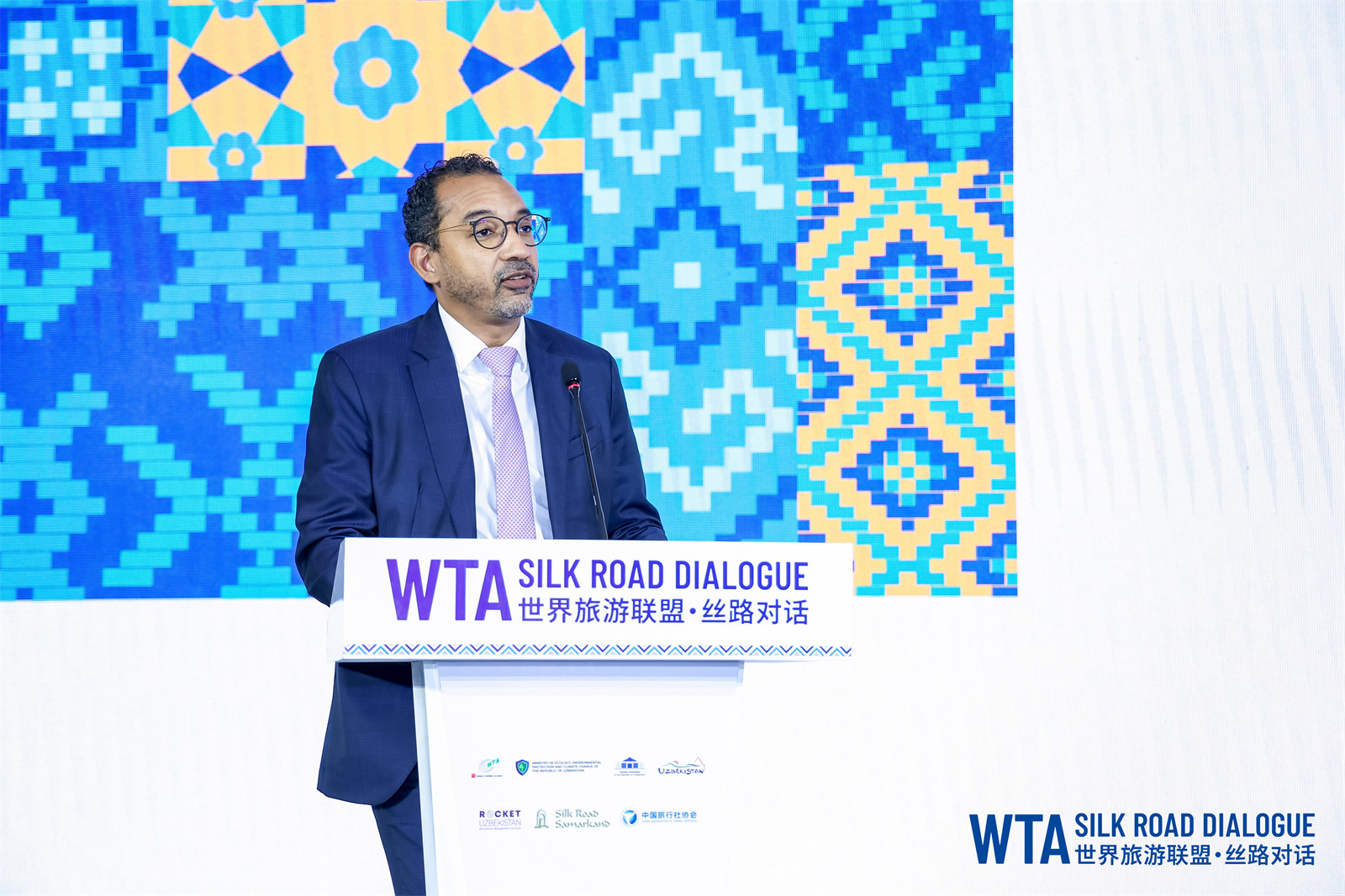2025-07-10
On July 3 (local time), the WTA·Silk Road Dialogue was held in Samarkand, Uzbekistan. Jaime Mayaki, Director of Technical Cooperation and Silk Road Department, UN Tourism, delivered a keynote speech titled "Data-Driven Insights: Emerging Opportunities in Silk Road Tourism". Here are key takeaways from the speech:

We gather here today in Samarkand, the very heart of the ancient Silk Road, united by a common purpose: to honor this invaluable cultural heritage and envision its future through the lens of sustainable tourism development. The countries along the Silk Road are not just stewards of this shared legacy; we are its living guardians. Through our collective vision and tireless efforts, we have cultivated resilient, innovative, and adaptive strategies that continue to shape the future of tourism.
As the strategic importance of Silk Road nations continues to rise, enhanced interconnectivity and ambitious infrastructure projects are unlocking new opportunities for institutional and financial cooperation, breathing new life into the region’s tourism potential. In this dynamic landscape, UN Tourism has taken a significant step by establishing a thematic office in Samarkand. This move marks a pivotal moment in refining international tourism standards and advancing Silk Road Tourism. The office will play a crucial role in evaluating cross-sector development plans and investments while acting as a platform for collaboration among Silk Road nations, global stakeholders, and the private sector.
Despite rapid growth of the tourism sector in Silk Road countries, particularly in Central Asia, we continue to face a range of challenges both now and in the foreseeable future. Regional integration of transport infrastructure and public services requires improvement, foreign direct investment flows unevenly across borders, and international tourism trade still faces restrictions. The Silk Road’s golden tourism corridor promises transformative opportunities, particularly for lower-income economies.
UN Tourism has made significant progress in blending traditional and innovative approaches to enhance both qualitative and quantitative data analysis. In recent years, several key projects have been successfully implemented, providing valuable case studies for advancing the sustainable development of tourism. These projects offer practical examples that can serve as models for future initiatives.
Recently, in Thassos, Greece, we conducted a resident tourism survey using online questionnaires. The focus was on gathering qualitative data regarding local residents’ views on the value of tourism development. This survey allowed us to identify key priorities for future tourism growth and gauge residents’ willingness to participate in decision-making processes related to tourism. The findings highlighted the critical need to balance the interests of visiting tourists with the well-being of local communities.
In Tajikistan, we undertook a series of practical initiatives to enhance the country’s data capabilities and support sustainable tourism development. We developed a comprehensive tourism strategy that included in-depth assessments across critical areas such as product development, marketing, human resources, and institutional collaboration, ensuring a coordinated and sustainable approach to tourism growth. Additionally, we partnered with two local universities to conduct research projects focusing on both domestic and international tourists. The goal was to gather data that could inform policymakers and stakeholders on ways to improve the visitor experience. Using a variety of survey methods, we collected valuable insights into tourists’ travel intentions, trip purposes, communication preferences, and satisfaction with transportation options. As a key outcome, we provided Tajikistan with a tailored statistical assistance program to support the country’s first Tourism Satellite Account (TSA) pilot project. This two-year initiative includes desk research, field investigations, capacity-building training, TSA form support, and the development of strategic recommendations and concrete action plans, with a focus on short-term, medium-term, and long-term implementation phases.
In Uzbekistan, as part of a collaborative project between UN Tourism and the European Bank for Reconstruction and Development (EBRD), we have successfully completed two significant data-driven initiatives. The first initiative involved developing a comprehensive tourism data needs assessment report. This report outlines effective methodologies for collecting and transmitting statistical data. It also includes recommendations for improving institutional coordination, adopting efficient communication strategies that integrate both traditional and digital channels, and strengthening partnerships with key stakeholders, such as universities and the private tourism sector, to ensure high-quality data acquisition. The second initiative focused on formulating a domestic marketing strategy aimed at audiences constrained by international travel limitations. This strategy provided valuable insights into the most effective information dissemination methods, communication channels, and the travel behavior characteristics of local tourists.
A final exemplary case of our data-driven approach is our active involvement in projects in Morocco and Jordan. In partnership with the EBRD, UN Tourism developed an innovative interactive tool called the "Tourism Dashboard" for relevant ministries. Created using Microsoft Power BI, this dashboard integrates multi-source data across key areas such as air connectivity, sustainability, employment, and other critical tourism dimensions, offering stakeholders a comprehensive data visualization platform. Through extensive consultations, we successfully tailored each dashboard to meet the specific needs of the respective ministries. This initiative highlights how our expertise significantly enhances decision-making capabilities within tourism administrations.
In conclusion, UN Tourism remains steadfast in its commitment to advancing sustainable tourism development, both today and in the future. Our newly established thematic office in Samarkand will play a key role, serving as an crucial platform not just for Uzbekistan and Central Asia, but also for all countries along the Belt and Road. This initiative will allow us to strengthen strategic partnerships, engage stakeholders in global programs, and collectively promote inclusive development by positioning tourism as a key driver of economic growth, cultural exchange, and regional integration. We reaffirm our dedication to this mission, pledging to assist more nations in enhancing their data collection capabilities, elevating tourism sector standards, amplifying the impact of our thematic office, and fully realizing tourism’s transformative potential.